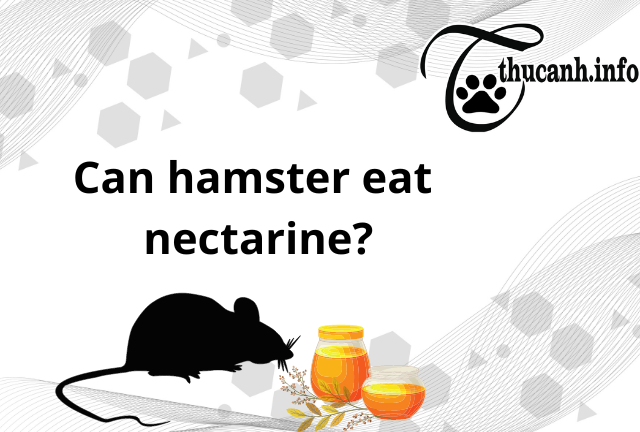Can Hamsters Eat Nectarines? As a hamster owner, you may wonder if nectarines are a suitable addition to your furry friend’s diet. This article will delve into the topic of feeding nectarines to hamsters, considering their safety, potential benefits, and nutritional value.

Is nectar good or bad for hamsters
1. Understanding Hamster Dietary Needs and Feeding Guidelines
Hamsters have specific dietary requirements that contribute to their overall health. While they are omnivores and can consume a variety of foods, it is important to understand what is safe and suitable for them. In this section, we will explore the dietary needs of hamsters and provide general feeding guidelines.
1.1. Can Hamsters Eat Nectarines?
Nectarines can be a refreshing and nutritious treat for hamsters. However, it is important to offer them in moderation due to their sugar content. While nectarines are generally safe for hamsters, it is essential to consider the size of the fruit, remove the pit, and serve it in appropriate portions to prevent choking hazards.
2. Exploring the Nutritional Value of Nectarines
Nectarines are known for their nutritional value and can be a rich source of vitamins and minerals. This section will examine the specific nutrients found in nectarines and their potential benefits for hamsters. We will explore their vitamin content, fiber content, and other essential nutrients that contribute to overall health.
2.1. Key Nutrients in Nectarines
Nectarines offer a range of essential nutrients that can support hamsters’ well-being. They are a good source of vitamin C, vitamin A, dietary fiber, and antioxidants. These nutrients contribute to healthy digestion, immune system function, and overall vitality in hamsters.
3. Can Hamsters Eat Nectarines? Safety Considerations
When it comes to feeding nectarines to hamsters, safety is a primary concern. While nectarines are generally safe for human consumption, certain factors need to be considered for hamsters. This section will discuss the potential risks associated with feeding nectarines to hamsters, such as the sugar content and digestive issues that may arise.
3.1. Moderation is Key
While nectarines can provide nutritional benefits, it is important to feed them to hamsters in moderation. The high sugar content in nectarines can lead to weight gain and other health issues if consumed excessively. It is recommended to offer small, bite-sized pieces of nectarines as an occasional treat, alongside a balanced diet of hamster-specific food.
3.2. Benefits of Nectarines for Hamsters
Nectarines offer potential health benefits for hamsters when included in their diet. This section will explore the reasons why nectarines can be beneficial, such as their antioxidant properties, contribution to digestive health, and potential immune system support. We will highlight the specific benefits that nectarines can provide to hamsters’ overall well-being.
3.3. Digestive Health Support
The fiber content in nectarines promotes healthy digestion in hamsters. It helps regulate bowel movements, prevent constipation, and maintain a balanced gut flora. Including nectarines in their diet can support hamsters’ gastrointestinal health and contribute to optimal digestion.

The fiber content in nectarines promotes healthy digestion in hamsters
3.4. Immune System Boost
Nectarines are rich in vitamin C and other antioxidants that can bolster hamsters’ immune systems. These nutrients help protect their cells from damage, reduce the risk of illnesses, and support overall immune function. Including nectarines as part of a varied diet can enhance hamsters’ natural defenses.
4. Introducing Nectarines to Your Hamster’s Diet
If you decide to offer nectarines to your hamster, it is essential to introduce them gradually and observe their response. This section will provide guidelines on how to prepare and serve nectarines to ensure their safety and enjoyment. It will also emphasize the importance of monitoring your hamster for any adverse reactions or digestive issues.
4.1. Preparation and Serving Suggestions
Before serving nectarines to your hamster, it is crucial to wash them thoroughly and remove the pit. Cut the nectarine into small, bite-sized pieces that are easy for your hamster to handle. This subsection will provide tips on proper preparation and serving methods to ensure your hamster can safely enjoy nectarines.
4.2. Monitoring for Adverse Reactions
As with any new food introduction, it is important to observe your hamster for any signs of allergic reactions or digestive issues. This subsection will outline common symptoms to watch out for, such as changes in behavior, appetite, or stool consistency. If any adverse reactions occur, it is best to discontinue feeding nectarines and consult a veterinarian if necessary.
5. Conclusion
Can Hamsters Eat Nectarines? In conclusion, nectarines can be a safe and nutritious addition to a hamster’s diet when offered in moderation. They provide essential nutrients, contribute to digestive health, and offer potential immune system support.
However, it is important to consider the sugar content, serve them in appropriate portions, and monitor your hamster’s response. Always prioritize your hamster’s specific dietary needs and consult with a veterinarian for personalized guidance.
By incorporating these additional heading 3 subsections, the article provides a more comprehensive exploration of the safety, benefits, and nutritional value of feeding nectarines to hamsters.


